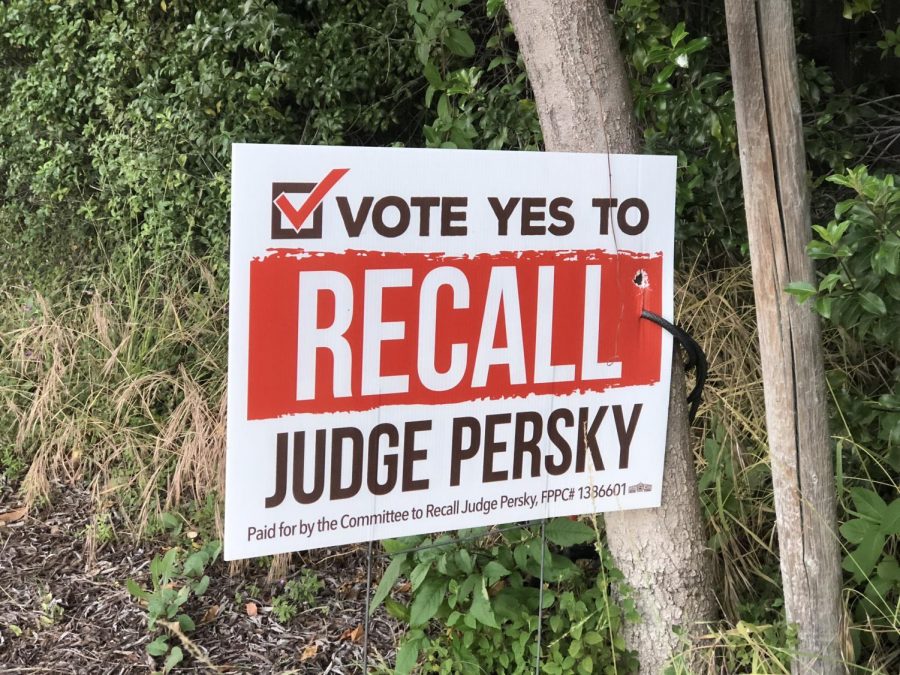Opinion: Can I still call myself a Feminist if I don’t think Judge Persky should be recalled?
June 2, 2018
My Opinion
The question that has been replaying in my mind since I first saw the black and white photo of Judge Persky side by side with Brock Turner outside school one morning. I was suddenly hit with a conundrum.
I think about sexual assault survivors every day. I think about how even after they have experienced trauma that is unimaginable and immeasurable, they still have courage and strength to wake up and keep moving forward. When Judge Persky gave Brock Turner a sentence of six months in prison back in June 2016, which was the recommendation of the probation officer, I was baffled. How could Brock Turner, who violated a woman that he did not know when they weren’t even capable of opening their own eyes, be given a mere six months in jail and be released three months early? How will this woman live on knowing that someone who stripped her from everything in the most vulnerable way, is walking the streets?
In response to this absurdly lenient sentence, California legislators moved promptly to solidify the sentencing statutes on sex crimes, including an expansion and clarification of the meaning of rape to encompass all forms of non-consensual assault. In September 2016, Governor Jerry Brown signed bill AB 2888, which bars a court from granting probation if a person is convicted of sexual assault and the victim was either unconscious or incapable of giving consent due to intoxication. The issues addressed in this bill respond to the most significant problems in the Brock Turner sentencing because the assault victim was unconscious and intoxicated, yet Turner was granted probation.
The intense impact statement that Turner’s victim read aloud in court went viral and inspired Michele Dauber to rally a group to recall Judge Persky. Dauber, a law professor at Stanford and family friend of the Turner victim, is an advocate against sexual violence. Together, Dauber and her team have collected over 90,000 signatures which is more than what is required to get the measure on the ballot. On June 5, Santa Clara County voters have the choice to vote for him or the two other candidates that are running to replace him.
While I agree entirely that the sentence given to Turner was light, the recall of Judge Persky is rash and impolitic. Neither equity for defendants nor the idea of judicial independence is obeyed if judges are conducted by their apprehension of public response instead of the character of the law.
We cannot indict judges for following their discretion within the law. Judges should not be fired because of the notions of voters and shouldn’t take public judgment into their decision-making. It is imperative in a democracy that individual judges and the judiciary are unbiased and objective of all external influences. In doing so, citizens can have certainty that their cases will be determined justly and under the law. Judicial independence is the foundation to an effective democracy.
Judges take an oath to “disregard public opinion” and “follow the law,” and will be checked and urged to hold their promise if Persky is removed. If Persky is recalled, systemic issues will arise because this will not affect one single judge in the Bay Area, but rather the entire judicial branch in America will be in a state of reform and check. Persky will be the first judge in 86 years to be removed. The last time a judge was successfully recalled in California was in 1932 when three judges were exercising their positions to promote their own financial and state goals in complete disregard for instituted judicial integrity. The last time a judge was recalled due to an unpopular decision was in 1913, when Albert Hendricks attempted to assault two female minors, and San Francisco Judge Charles Weller lowered his bail from $3,000 to $1,000.
Progressives say that judges should be culpable to the yearning of the people and in the past century, recalls have been aimed towards male representatives who were seen as apathetic to sexual violence. However, 46 California law professors signed a letter that, while reprimanding Brock Turner’s sentence, alerted that a judge recall could create “grave collateral damage” to justice. Public defenders in support of Persky forewarn in an online petition that his removal would “deter other judges from extending mercy.”
Targeted interventions could dispirit active judges into thinking twice about decisions concerning contentious matters rather than following the law that has already been modified as a result of this case. This could jeopardize the state judiciary and turn it into a political fixture rather than one that keeps the state united.
Being a Feminist
So here I stand, behind a judge who gave a man an absurd sentence for sexually assaulting an intoxicated woman at a college party. And while that makes me feel like someone who does not advocate for women’s rights, taking a position against the recall of Judge Persky does not mean that I’m not a feminist.
The issue about whether a judge should be recalled simply because you disagree with their decision, does not do anything to advance or protect women’s rights and does not correlate to it at all. After Turner was given the lenient sentence, the country was outraged and California sought change. The public received change through the enactment of a new law imposing mandatory minimum sentencing requirements to those convicted of sex crimes. That law ensures that a 6-month sentence would no longer be possible and therefore advancing and protecting victims of sexual violence. Although I can not personally relate to what actually would give closure to a victim of sexual violence, I believe removing a judge from office for imposing a light, but lawful sentence, does not protect victims more so than the new law does.
U.S. Congresswoman Anna Eshoo stated on Wednesday, “We’re a nation of laws. The independence of the judiciary is essential. Yes, there are mechanisms to remove corrupt individuals and incompetent individuals, but I go a step higher on the ladder, given what’s taken place and that the law has been changed.”
If the recall is successful, marginalized groups such as African-Americans and Latinos, will be put at an even greater disadvantage in the courtroom. Unfortunately, in today’s current political climate, nonwhite men are more likely to be observed as predatory by complainants, police, prosecutors, witnesses and juries, than their white counterparts. Latinos and African-Americans are more likely to be stopped and questioned, arrested, and convicted than whites.
“This would inevitably lead to harsher punishment because, politically, it’s always safer for a judge to throw the book at a convicted criminal rather than give him a break – even when giving him a break is the right thing to do.” Georgetown law professor Paul Butler writes in the New York Times. “The people who would suffer most from this punitiveness would not be white boys at frat parties. Almost 70 percent of the people in prison in California are Latino and African-American. Those are the groups that would bear the brunt of zealous punishment.”






Gretchen Craford | Jun 3, 2018 at 8:07 am
Thank you, Mia, for sharing your opinion.
I have been struggling with my decision on how to vote on the recall since day 1 of the Persky verdict.
The historic facts you include on previous recall efforts and your fair summary of the pro and con campaign points helped me finalize my “No” vote.
Keep on writing!
Gretchen